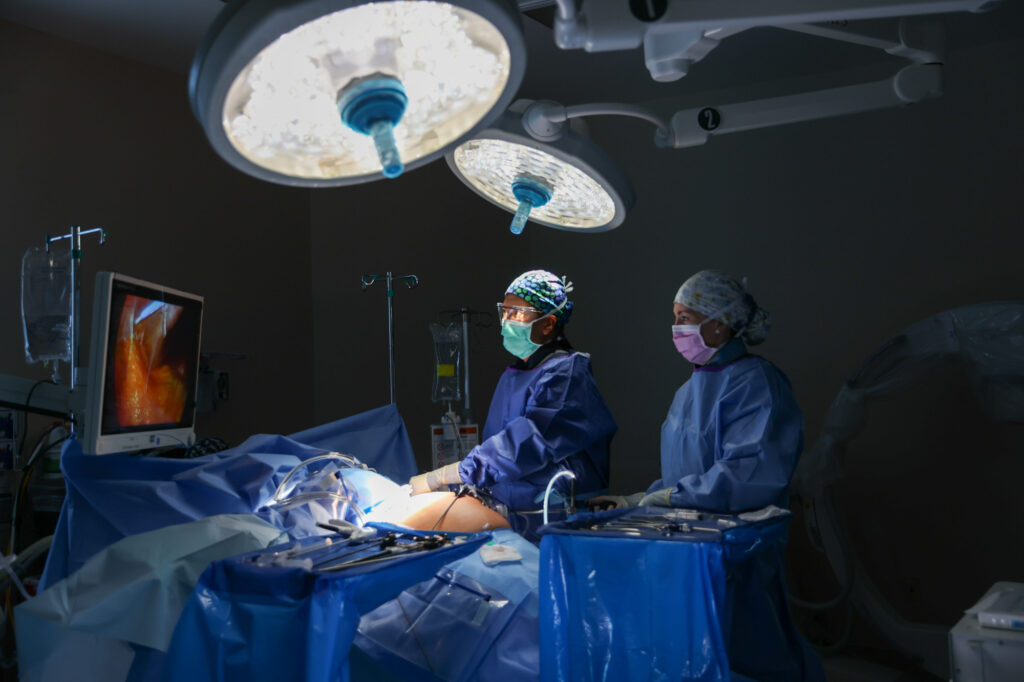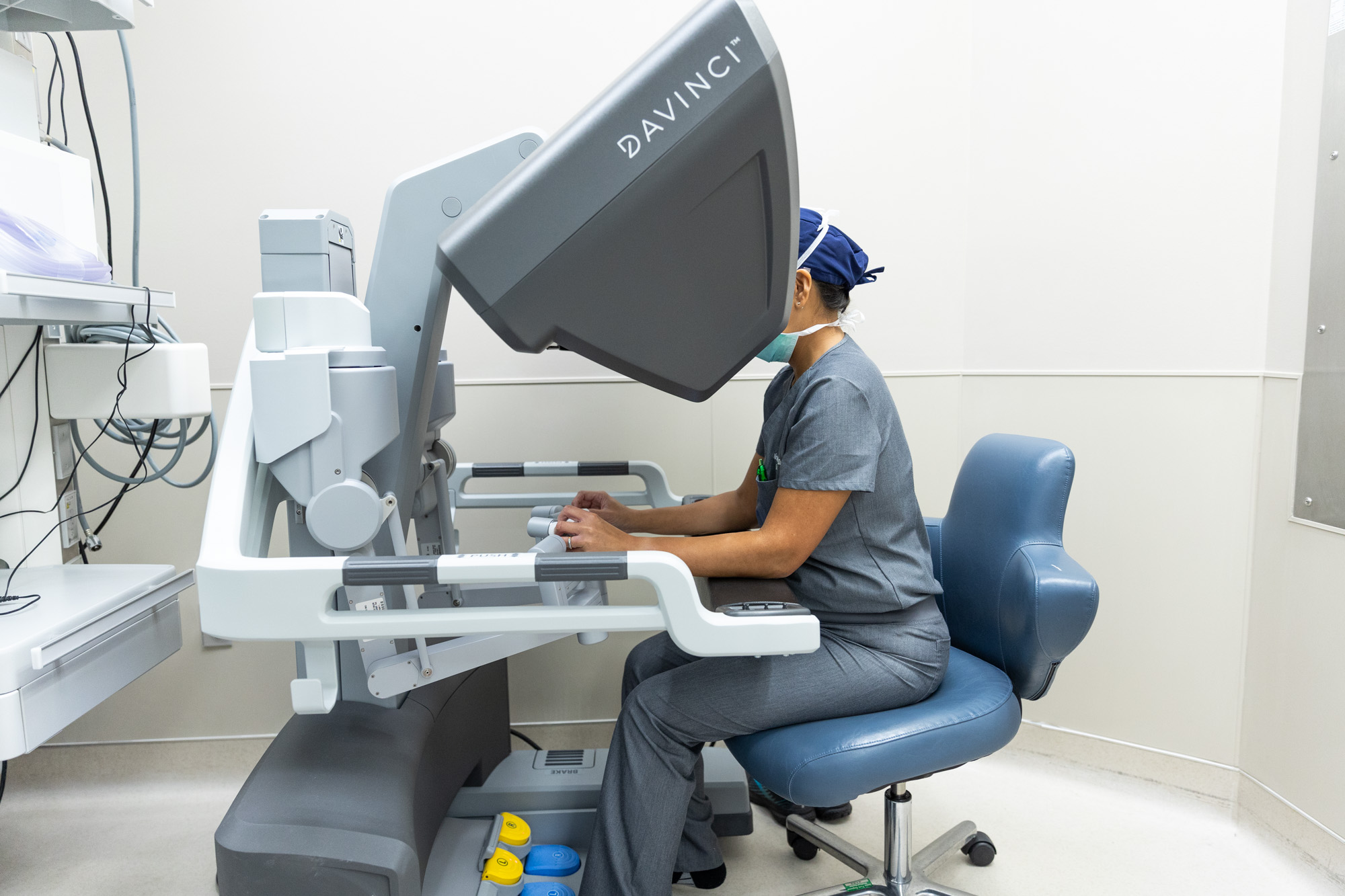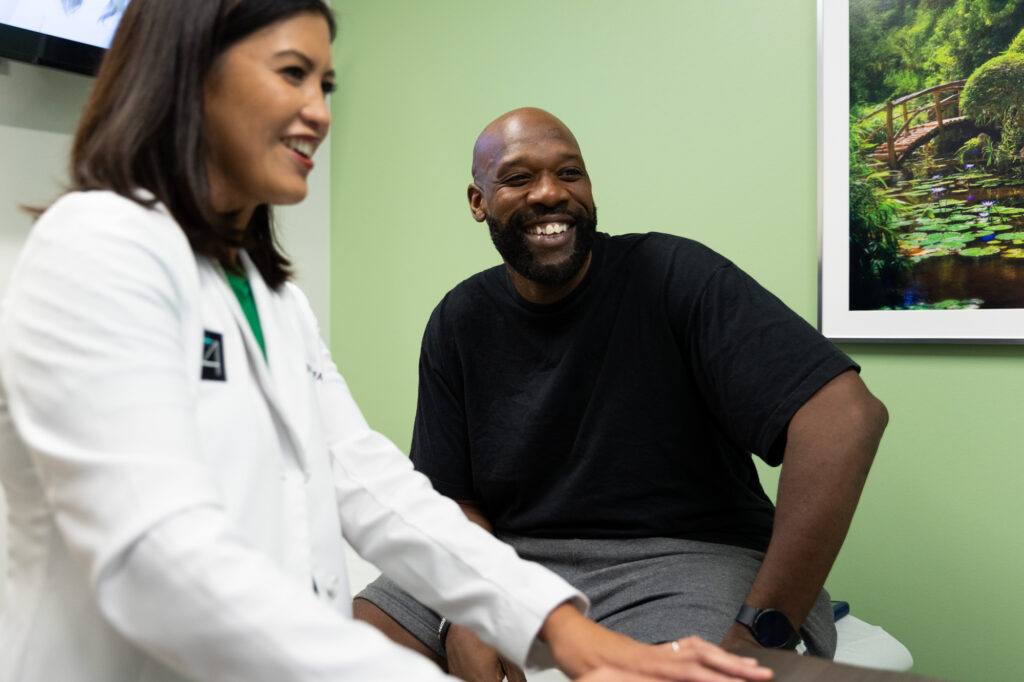
Losing weight through diet, exercise, and lifestyle changes is challenging. These solutions often don’t give patients the long-term weight-loss results they want. At B+A Surgeons, we understand that frustration and provide our clients with sustainable weight-loss solutions through bariatric surgery.
B+A Surgeons is a family team founded by Dr. Nicole Basa and Dr. Alan Abando. For over 15 years, the surgeons have dedicated their work to providing long-term weight reduction with weight loss surgery in Austin. They have created a destination for Cedar Park patients to transform their health and bodies in a judgment-free environment.
In this blog, we will discuss the weight loss surgical procedures Dr. Basa and Dr. Abando perform.
Weight Loss Surgery in Austin
Dr. Basa and Dr. Abando are expert bariatric surgery providers. They use 4 different bariatric surgical procedures to help patients experience significant weight loss and achieve sustainable results. Generally, bariatric surgery is the most effective option for helping people maintain significant weight loss.
B+A Surgeons understands that surgery may seem intimidating, but our team is here to ensure you never feel overwhelmed. We will always have your health and best interest in mind when we discuss your procedure options, so you can decide what weight loss surgery in Austin can help you reach your goals.
Before Your Surgery
To ensure all our patients have the best possible outcome, we have a few steps every bariatric patient must complete before their surgery. We’ll go over all these steps during our consultation, but you can start thinking about and implementing our surgery prep steps today:
- Start by making a goal to lose 5% to 10% of your starting weight. This helps reduce intra-abdominal fat and shrinks the liver, allowing for a safer surgical procedure.
- Undergo cardiopulmonary stress testing to screen for surgical risk factors.
- Consider seeking counseling for emotional eating.
- Begin drinking 64 ounces of water a day, a daily walking routine, eating healthy, and incorporating a daily breakfast routine.
- Start working on eliminating daytime snacking, slowing eating (chewing food 20 to 30 times), and putting your utensils down between bites.
Gastric Sleeve Surgery
B+A Surgeons uses gastric sleeve surgery (also referred to as sleeve gastronomy) to reduce how much food the stomach can hold, making it easier for patients to eat smaller meals and take in fewer calories. Your intestines will stay intact, meaning your ability to absorb nutrients will remain the same.
How It Works
Our surgeons use laparoscopic surgery to perform gastric sleeve surgery because it typically reduces the risk of surgical complications, minimizes the chances of infection, can decrease the amount of recovery time needed, and can reduce post-surgical pain.
After making small incisions, your surgeon will place a small camera under your skin to project an image of your internal organs, allowing our team to monitor your surgery. Next, your surgeon will use the instruments to remove approximately 75% of your stomach, creating a small, banana-shaped pouch.
Gastric Bypass
Our Roux-en-Y gastric bypass surgery also involves reducing the size of your stomach while bypassing part of the upper portion of the small intestine.
How It Works
This laparoscopic procedure is similar to gastric sleeve surgery but has one notable difference. Here are the details:
During surgery, your surgeon will create a small pouch that can hold a few ounces of food at a time.
Next, the pouch will be reattached to the central part of the small intestine and the part which contains the digestive juices will be reconnected to the intestine that contains the food. This “bypass” causes the body to absorb fewer calories.
Because your body will not absorb as many calories going forward, you’ll need to start taking a supplement following your surgery to ensure you get enough nutrients. You will also be unable to take NSAIDs due to the risk of developing ulcers.
Modified Duodenal Switch
At B+A Surgeons, we recommend the modified duodenal switch (also called the laparoscopic single anastomosis duodenal-ileal bypass with sleeve, SADI-S) for patients with severe obesity.
How It Works
This two-part surgery is best explained as a combination of a gastric bypass surgery and a sleeve gastrectomy surgery.
- Sleeve portion: During the first part of the surgery, your surgeon will remove part of your stomach. This restricts the amount of food you can eat at one time.
- Bypass portion: Next, your surgeon will bypass a section of your small bowel to reduce the area available for absorbing calories and nutrients.
Our surgeons use the robotic da Vinci Surgical System to perform this surgery, decreasing the risk of surgical complications patients sometimes face with other types of invasive procedures.
Robotic-Assisted Surgery
Dr. Basa and Dr. Abando use the robotic da Vinci Surgical System to perform the modified duodenal switch and other types of surgeries at B+A Surgeons.

What It Does
When performing weight loss surgery in Austin, Dr. Basa and Dr. Abando control each of the da Vinci Surgical System’s movements through the robotic console. While the surgical robotic arms hold the camera and the surgical instruments through the port sites, your surgeon will control the robotic movements.
How It Works
The surgeon performing your procedure will sit at the robotic console, which has a viewer that shows a 3D image of the surgical site. During the surgery, the surgeon controls the instruments the robot holds to move the camera and surgical instruments precisely with their fingers.
Dr. Basa and Dr. Abando have performed thousands of robotic bariatric and general surgeries. Their proficiency and skill have enabled them to be National Intuitive Robotic proctors and trainers for other surgeons.
Surgical Benefits
In addition to allowing the surgeon to make more precise movements, patients will benefit from our robotic surgical system in the following ways:
- Patients may experience less scarring, blood loss, and pain.
- Recovery times are often shorter.
- There may be fewer surgical complications.
- Surgeons can likely make smaller incisions.
The robotic system also allows our surgeons to provide weight loss surgery in Austin to patients with a higher BMI.
Lap Band Removal Surgery
Unfortunately, B+A Surgeons does not perform lap band surgeries because research shows they aren’t effective for achieving long-term, sustained weight loss. However, if you had a lap band procedure in the past and want to remove it, we have a few options:
- Our surgeons can remove the lap band.
- Our surgeons can remove the lap band and convert it to a more effective method. Options include the laparoscopic sleeve gastrectomy or the Roux-en-Y gastric bypass.
Surgery Recovery
All our minimally invasive procedures for weight loss surgery in Austin have a relatively small amount of downtime, typically requiring 1 to 2 weeks for recovery.
While many patients will need to stay overnight following their procedure, some may be able to go home the same day, hours after surgery. The chances of your surgery having an outpatient option depend on the procedure you have and your unique needs.
New Diet Progression
Your new diet will start following your surgery. First, you’ll drink clear liquids, then move to full liquids, followed by purées, soft solids, and a regular diet within 2 to 3 months.
Patient Testimonials
As you can imagine, losing a significant amount of weight thanks to weight loss surgery in Austin is a significant achievement, especially after trying different diets and lifestyle changes for years.
Read about Ashley’s experience at B+A to get a better understanding of how impactful these surgeries are and how they can help you reach your goals:
“My journey started back at the end of high school; it’s when I first started struggling with my weight. I went through a process where I would yo-yo diet; I would diet, lose the weight, then regain it. And I struggled with that from the age of 16 into my adult years. I finally started to look into some weight loss surgeries. I started doing research because it was important to me to find a surgeon that was a good fit for me and to know that I’d have that support since it was such a drastic measure to take in order to lose the weight.
I came across some social media reviews on Dr. Basa and Dr. Abando. I reached out to the office and made an appointment, and they were able to get me in pretty quickly—within a month—for a consultation.
I came in and saw Dr. Basa, and she reviewed the different options I had. There were a few different types of surgeries, and she went into detail with each of them and took her time with me so that I understood what each one entailed and what to expect. Before I left the appointment, I knew that the surgery was right for me, and I elected to go with the sleeve gastrectomy.
Throughout the process, the office was incredible. From the bariatric coordinators to the insurance coordinators, they set everything up for me. It was the least stressful process I’ve ever dealt with. I never had to pick up a phone to make an appointment. I was able to complete all my pre-op requirements within 2 months and had my sleeve gastrectomy 2 months after my consultation.
I had a great experience post-op as well. I was in the hospital for the required 24 hours. I got up, I followed all the instructions that were given to me to walk to relieve the pain, and I was able to go home on time and finish the healing process at home. I followed up about 10 days post-op with Dr. Basa, and everything was healing well at that point in time. I had great support from the dietician in the office, who led me through the different food stages, which helped me stay on course and lose the weight at the expected timeframes in the process.
I am a year out now, and down 90 pounds, and feeling great. I say that the only regret I have is not looking into the surgery and going for the consultation earlier.
I think it’s such a great option for people. People don’t really know what the surgery entails, and they are really uneducated about it. For me, I realize it’s a tool, and with the right support through the office, I was able to be successful in my journey and lose all the weight I was hoping to lose.”
B+A Surgeons’ Providers Offer Expert Care to Patients Seeking Weight Loss Surgery in Austin
You will get expert care when you partner with B+A Surgeons for your bariatric surgery needs.
Dr. Basa and Dr. Abando are board-certified general surgeons with years of experience. Their compassionate approach, extensive knowledge, and skill sets make them the perfect providers for your weight loss surgery needs in Austin.
Our surgeons care about their patients’ goals and will be with you during every step of your medical journey. We tailor each procedure to our patients’ needs and always have their best interests in mind.
Ready to get started? Schedule a consultation with one of our experienced providers today, or use our virtual treatment builder to receive personalized treatment recommendations directly from us.

